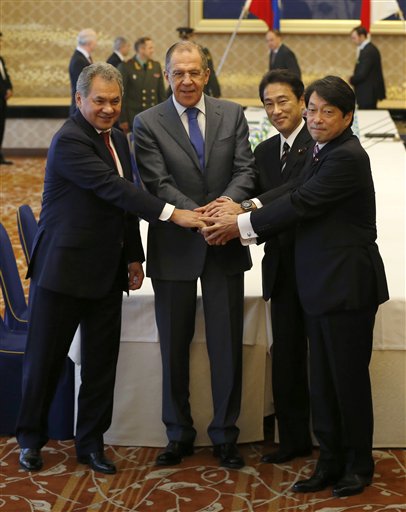
By MARI YAMAGUCHI
Russian Foreign Minister Sergey Lavrov, second from left, and Defense Minister Sergei Shoigu, left, pose with Japanese Foreign Minister Fumio Kishida, second from right, and Defense Minister Itsunori Onodera for photographers at the start of their foreign and defense ministers meeting called “two-plus-two” at Iikura guest house in Tokyo Saturday, Nov. 2, 2013. (AP Photo/Issei Kato, Pool)
Sergey Lavrov, Sergei Shoigu
Russian Foreign Minister Sergey Lavrov, second from left, and Defense Minister Sergei Shoigu, third from left, sit during their “two-plus-two” meeting with Japanese Foreign Minister Fumio Kishida and Defense Minister Itsunori Onodera at Iikura guest house in Tokyo Saturday, Nov. 2, 2013. (AP Photo/Issei Kato, Pool)
Sergey Lavrov, Sergei Shoigu, Fumio Kishida, Itsunori Onodera
Russian Foreign Minister Sergey Lavrov, fifth from left, and Defense Minister Sergei Shoigu, sixth from left, sit with Japanese Foreign Minister Fumio Kishida, fifth from right, and Defense Minister Itsunori Onodera, sixth from right, at their meeting called “two-plus-two” at Iikura guest house in Tokyo Saturday, Nov. 2, 2013. (AP Photo/Issei Kato, Pool)
Sergey Lavrov, Sergei Shoigu, Fumio Kishida, Itsunori Onodera
Russian Foreign Minister Sergey Lavrov, second from left, and Defense Minister Sergei Shoigu, left, reach out to shake hands with Japanese Foreign Minister Fumio Kishida, second from right, and Defense Minister Itsunori Onodera for photographers at the start of their foreign and defense ministers meeting called “two-plus-two” at Iikura guest house in Tokyo Saturday, Nov. 2, 2013. (AP Photo/Issei Kato, Pool)
Sergey Lavrov, Sergei Shoigu, Fumio Kishida, Itsunori Onodera
Russian Foreign Minister Sergey Lavrov, second from left, and Defense Minister Sergei Shoigu, left, pose with Japanese Foreign Minister Fumio Kishida, second from right, and Defense Minister Itsunori Onodera for photographers at the start of their foreign and defense ministers meeting called “two-plus-two” at Iikura guest house in Tokyo Saturday, Nov. 2, 2013. (AP Photo/Issei Kato, Pool)
Prev
1 of 5
Next
TOKYO (AP) — Japan and Russia held their first high-level defense and diplomatic talks Saturday and agreed to step up cooperation between their militaries amid regional security concerns such as North Korea and China.
Japanese Foreign Minister Fumio Kishida and Defense Minister Itsunori Onodera, and their Russian counterparts Sergei Lavrov and Sergei Shoigu also agreed to hold joint military and anti-piracy exercises and establish a defense consultation framework.
Lavrov told a news conference after Saturday’s talks that upgrading defense ties between the two countries could serve their national interests in resolving terrorism and North Korea’s nuclear threats, as well as other regional disputes. He also welcomed the talks as a landmark development for Russia and Japan.
“I believe this event today indicates a new stage in the relationship between Russia and Japan,” Lavrov said at the outset of the meeting.
Russia’s Defence Minister Sergei Shoigu said that the cooperation between Japan and Russia will “promote trustful relationships in the Asia-Pacific region.”
Earlier Friday, Japan and Russia agreed to continue discussing a territorial dispute that has kept the nations from signing a peace treaty.
“We need to act constructively. We should not be emotional, and avoid provocative remarks,” Lavrov said in Friday’s news conference.
The diplomats also agreed to hold vice-ministerial talks in late January or February, ahead of Kishida’s planned visit to Russia in the spring.
Lavrov did not mention an attack on Russian missiles in Latakia in Syria. Kishida said he and Lavrov planned to discuss Syria, Iran, Afghanistan and other international issues at Friday’s working dinner, which was closed to the media.
Japan is seeking to broaden its defense ties, in addition to its key security alliance with the United States, in response to China’s growing military presence and threats from North Korea.
Russia has been expanding its trade ties in Asia and President Vladimir Putin has actively sought closer relations with Japan, partly as a counter to China’s rising military power.
It’s unclear how much progress is being made toward a resolution of a dispute over four islands that were seized by Soviet forces at the end of World War II. The dispute has kept the two nations from signing a peace treaty formally ending their World War II hostilities.
Japan and Russia have also stepped up cooperation in developing energy resources, especially liquefied natural gas. Kishida said trade between the two countries totaled a record $33 billion last year, and that further growth is expected this year.



